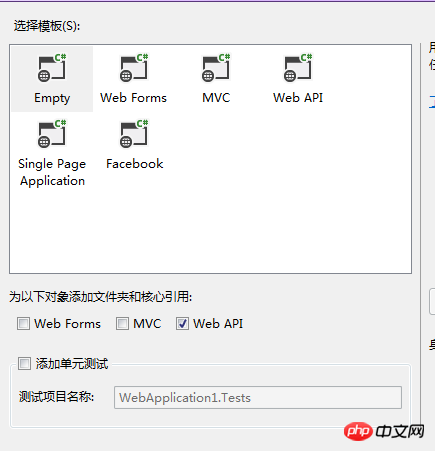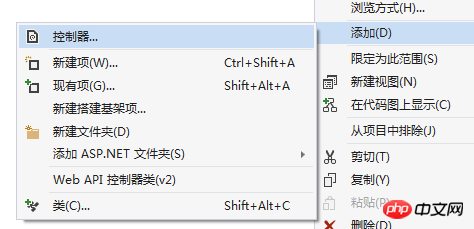Heim >Backend-Entwicklung >C#.Net-Tutorial >Einführung in die Methode zur Verwendung von Rest unter asp.net MVC
Einführung in die Methode zur Verwendung von Rest unter asp.net MVC
- 巴扎黑Original
- 2017-09-20 09:44:061958Durchsuche
本篇文章主要介绍了asp.net MVC下使用rest的方法,小编觉得挺不错的,现在分享给大家,也给大家做个参考。一起跟随小编过来看看吧
前言
最近做了下个MVC的项目,需要用到rest接口,与java写的应用程序通信,包括数据的接收和发送,那么我将用实用的角度来全面的讲解一下它的使用方法
一、创建rest服务
首先创建一个Asp.Net Web应用程序(我这里用的是Visual Studio 2013,它已经内置了Web API2)。

在出来的模板中选择Empty(空项目),并勾选WebAPI。点击确定后,就创建了一个空的WebAPI服务。

此时只有一个空项目,还没有任何功能,在进行下一步之前,首先我们来看一下REST的基本操作模型,大致可以分为如下四种:
POST — 创建资源
GET — 检索资源
PUT — 更新资源
DELETE — 删除资源
非常经典的CRUD模型。在Web API中实现这样一个的模型是非常简单的,直接使用向导建一个Controller即可


如果用传统的向导,记得把向导后面的那个1给去掉:
默认的模板内容如下:
public class ValuesController : ApiController
{
// GET api/<controller>
publicIEnumerable<string> Get()
{
returnnewstring[] { "value1", "value2" };
}
// GET api/<controller>/5
publicstring Get(int id)
{
return"value";
}
// POST api/<controller>
publicvoid Post([FromBody]string value)
{
}
// PUT api/<controller>/5
publicvoid Put(int id, [FromBody]string value)
{
}
// DELETE api/<controller>/5
publicvoid Delete(int id)
{
}
}这其实已经帮我们实现了一个最基本的服务了,这样别人就可以访问我们的服务中的方法
二、调用其它应用程序的rest服务
1、RestClient类
为了便于使用,我们需要封装客房端的rest类,话不多说,我们直接上这个类的代码:
using System;
using System.Collections.Generic;
using System.IO;
using System.Linq;
using System.Net;
using System.Text;
using System.Web;
namespace OilDigital.A2_A27.Web
{
public class RestClient
{
public string EndPoint { get; set; } //请求的url地址
public HttpVerb Method { get; set; } //请求的方法
public string ContentType { get; set; } //格式类型:我用的是application/json,text/xml具体使用什么,看需求吧
public string PostData { get; set; } //传送的数据,当然了我使用的是json字符串
public RestClient()
{
EndPoint = "";
Method = HttpVerb.GET;
ContentType = "application/x-www-form-urlencoded";
PostData = "";
}
public RestClient(string endpoint)
{
EndPoint = endpoint;
Method = HttpVerb.GET;
ContentType = "application/json";
PostData = "";
}
public RestClient(string endpoint, HttpVerb method)
{
EndPoint = endpoint;
Method = method;
ContentType = "application/json";
PostData = "";
}
public RestClient(string endpoint, HttpVerb method, string postData)
{
EndPoint = endpoint;
Method = method;
ContentType = "application/json";
PostData = postData;
}
public RestClient(string endpoint, HttpVerb method, string postData, string contentType)
{
EndPoint = endpoint;
Method = method;
ContentType = contentType;
PostData = postData;
}
public string MakeRequest()
{
return MakeRequest("");
}
public string MakeRequest(string parameters)
{
var request = (HttpWebRequest)WebRequest.Create(EndPoint + parameters);
request.Method = Method.ToString();
request.ContentType = ContentType;
if (!string.IsNullOrEmpty(PostData) && Method == HttpVerb.POST)//如果传送的数据不为空,并且方法是post
{
var encoding = new UTF8Encoding();
var bytes = Encoding.GetEncoding("iso-8859-1").GetBytes(PostData);//编码方式按自己需求进行更改,我在项目中使用的是UTF-8
request.ContentLength = bytes.Length;
using (var writeStream = request.GetRequestStream())
{
writeStream.Write(bytes, 0, bytes.Length);
}
}
if (!string.IsNullOrEmpty(PostData) && Method == HttpVerb.PUT)//如果传送的数据不为空,并且方法是put
{
var encoding = new UTF8Encoding();
var bytes = Encoding.GetEncoding("iso-8859-1").GetBytes(PostData);//编码方式按自己需求进行更改,我在项目中使用的是UTF-8
request.ContentLength = bytes.Length;
using (var writeStream = request.GetRequestStream())
{
writeStream.Write(bytes, 0, bytes.Length);
}
}
using (var response = (HttpWebResponse)request.GetResponse())
{
var responseValue = string.Empty;
if (response.StatusCode != HttpStatusCode.OK)
{
var message = String.Format("Request failed. Received HTTP {0}", response.StatusCode);
throw new ApplicationException(message);
}
// grab the response
using (var responseStream = response.GetResponseStream())
{
if (responseStream != null)
using (var reader = new StreamReader(responseStream))
{
responseValue = reader.ReadToEnd();
}
}
return responseValue;
}
}
}
public enum HttpVerb
{
GET, //method 常用的就这几样,当然你也可以添加其他的 get:获取 post:修改 put:写入 delete:删除
POST,
PUT,
DELETE
}
}2、RestClient类使用
有了这个类后我们就很方便的去调用别人的rest服务了,使用方法如下:
①,基本的调用:
var client = new RestClient(); string endPoint = @"http:\\myRestService.com\api\"; var client = new RestClient(endPoint); var json = client.MakeRequest();
②,如果你想带入参数
var json = client.MakeRequest("?param=0");③,使用最多的方式
var client = new RestClient();
client.EndPoint = @"http:\\myRestService.com\api\"; ;
client.ContentType = "application/json";
client.Method = HttpVerb.POST;
client.PostData = "{postData: value}";
var json = client.MakeRequest();三、我自己项目中的使用
1、首先我测试了一下,我调用我自己的rest服务的带参的get方法,当然我这里传的参数直接写在url的后面在,参数形式是string,所以接收的get方法的形参也要改成string,这样你就
可以接收到传过去的参数了。当然别人应用程序也是可以调的。只要把url给他就行了。
/// <summary>
/// 从接口中获取当前用户所有信息
/// </summary>
/// <param name="userId">用户ID</param>
/// <returns>json对象</returns>
public string GetCurrentUserInfo()
{
string userId = GetCurrentUserId();
string endPoint = "http://localhost:100/Api/RestService/"+userId;
var client = new RestClient(endPoint);
var userInfo = client.MakeRequest();
return userInfo;
}2、接下来,我要开始试用java写的应用程序下的rest服务了,我通过我传过去的用户ID获取到了用户的所有信息,当然我在项目中使用了缓存技术,还将返回回来的json字符串转换成了json对象,以便我后面好用linq对其进行操作,关于linq to json 可以参考我的linq专题相关文章 ,我在项目中的代码是酱子的:
/// <summary>
/// 从接口中获取用户所有信息
/// </summary>
/// <param name="userId">用户ID</param>
/// <returns></returns>
public static JObject CacheUser()
{
try
{
string currentUser = GetCurrentUserId();
if (HttpRuntime.Cache.Get("user$" + GetCurrentUserId()) == null)
{
string endPoint = "http://66.66.66.666:6666/DASBASE/restServices/dataCollectionService/getUserPermissions";
string postData = "jsonData={\"userCode\": \"kfry\",\"systemId\": \"1E1A7AC94BFC41D4BEBED8942EB69689\"}";
var client = new RestClient(endPoint, HttpVerb.POST, postData, "application/x-www-form-urlencoded");
var u = client.MakeRequest();
JObject userInfo = JObject.Parse(u);
//插入缓存
HttpRuntime.Cache.Insert("user$" + currentUser, userInfo, null, System.DateTime.UtcNow.AddMinutes(30), TimeSpan.Zero);
}
return (JObject)HttpRuntime.Cache.Get("user$" + GetCurrentUserId());
}
catch (Exception ex)
{
throw new ApplicationException("获取用户信息出错:"+ex.Message);
}
}Das obige ist der detaillierte Inhalt vonEinführung in die Methode zur Verwendung von Rest unter asp.net MVC. Für weitere Informationen folgen Sie bitte anderen verwandten Artikeln auf der PHP chinesischen Website!

